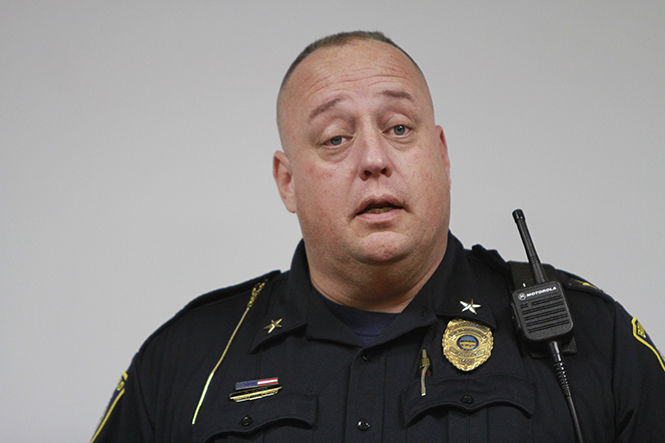Our View: A positive legacy tarnished?
Brimfield Police Chief and Facebook “internet sensation” David Oliver speaks to Kent State students on Oct. 8, 2013 about his many experiences in the police force. From years of helping on the drug task force, to his more recent ones that revolve around helping the community through his notoriety on Facebook, Oliver has built quite a background for himself prior to the interest buzz. Oliver recently released a book called “No Mopes Allowed”, inspired by the well-known Facebook page.
January 19, 2015
Last week, a community fell from grace. Chief David Oliver, the police chief of Brimfield Township, resigned his post amidst a gender discrimination claim. While the board of trustees in the township accepted the resignation, many of the area residents expressed their disdain for the board’s acceptance of the resignation. The community clearly supported the chief they knew. Unfortunately, it appears that the public perception of Oliver wasn’t the entire story.
While the focus now is on the accusations and reports of gender discrimination, as well as other acts of potential misconduct and possible issues related to the psychological effects of a previous criminal case, the bigger picture should also be realized. Through the active use of the department’s Facebook page and tactics in the community, Oliver established a model of community policing that is often nonexistent in the U.S. He became a recognizable public persona. The tactics and behavior of the Brimfield police became the attention of a national spotlight in a positive way.
In a time when violence against police has become commonplace, and when more citizens fear the law enforcement officers in their communities, Oliver set a different tone. He was jovial; he represented not only what a police officer could have been, but also what the community wanted to see. His department enforced the law. But its members also represented the positive attributes of being officers in blue.
We believe it is important to remember this model of policing in the midst of a negative media storm. What Oliver did at the community level should be embodied and embraced not only by other law enforcement agencies, but all community leaders. It is important to be present. But it is also important to be held accountable for your actions.

























